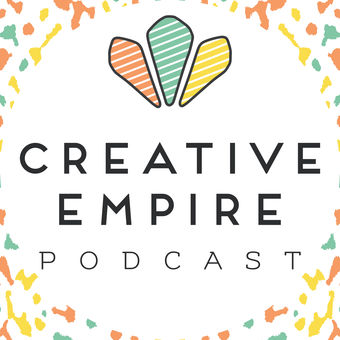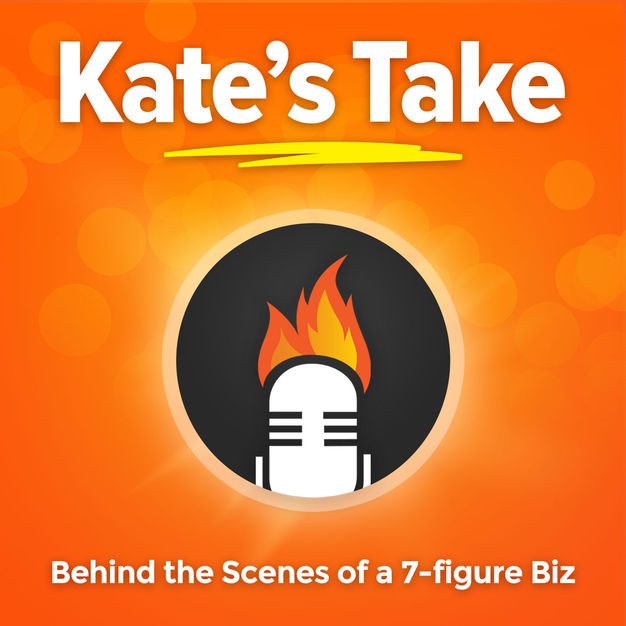
What Works
Tara McMullin
The Nuts & Bolts of Building A Stronger Business
- 30 minutes 31 secondsEP 451: An Inbox Full of Lies
Over the next few weeks, I've got something a wee bit different for you! This is the very first edition of Cold Pitch, an experimental media project from YellowHouse.Media. Cold Pitch explores media, curiosity, and identity through a variety of forms and methods.
In this first edition, Sean McMullin (my husband & partner at YellowHouse.Media) and I talk about, well, cold pitches. A cold pitch, simply put, is a request to a stranger to do something for you. Podcasters deal with cold pitches every single day. Most are terrible. Not only are they irrelevant and poorly executed—they most often start with an outright lie.
I have feelings. Clearly.
In this conversation, we talk about the social "meat space" basis of a cold pitch, the psychology of email, what you might learn from the autistic folks in your life about honest & direct communication and more.
If you dig it, follow along with Cold Pitch at coldpitch.substack.com
And you can find a written version of this edition, along with links to references, here: https://coldpitch.substack.com/p/an-inbox-full-of-lies- Learn more about YellowHouse.Media, our audio production agency
- Find out more about Sean McMullin
- Support What Works
30 November 2023, 2:48 pm - 33 minutes 27 secondsEP 450: The Will to Share Power with Tania Luna
This is the final installment in Strange New Work, a series that uses speculative fiction to explore radical work futures.
Power. Some fear it. Others hoard it. Some with power speak softly. Others carry a big stick. Power is charisma, or coercion, or violence. Power is name recognition, or money, or computer code.
Regardless of your definition or perceptions of it, power plays a critical role in how we work.
Today, we explore power—what we can do with it, how we can grow it, and, critically, how we can share it—because power in the future of work will look very different than it does today.
Footnotes:
- Find out more about Tania Luna
- Lead Together by Tania Luna
- The Power Paradox by Dacher Keltner
- The Lathe of Heaven by Ursula K. Le Guin
- "The Lathe of Heaven" BBC film adaptation
- "Mary Parker Follett—Creativity and Democracy" by Gary M. Nelson in Human Service Organizations
- "There Is a Better Way to Use Power at Work. This Forgotten Business Guru Has the Secrets" by Matthew Barzun in Time Magazine
- "Content Decision Making" via Sociocracy For All
- Emergent Strategy by adrienne maree brown
- The Dispossessed by Ursula K. Le Guin
- "A Band of Brothers, a Stream of Sisters" by Ursula K. Le Guin
★ Support this podcast ★2 November 2023, 1:20 pm - 35 minutes 18 secondsEP 449: The Most Undervalued Skill of the 21st-Century Economy
This is the penultimate episode of Strange New Work, a special series from What Works that explores the future of work through the lens of speculative fiction.
What's the most undervalued skill of the 21st-century economy? Moderation.I very well might be forgetting something. But with more of our lives and work showing up online every day, the way our feeds, data, and connections are moderated is critical to our daily lives. Moderation can be many things—it's how platforms are designed, how content is incentivized or de-incentivized, and how communication between people is mediated. Some moderation is done structurally, some is done with code, but lots of moderation is done by real people all over the world.
In this episode, I take a close look at the skill of moderation, its role in our evolving tech futures, and the politics that complicate this essential work.
Footnotes:
- "Welcome to hell, Elon" by Nilay Patel on The Verge
- "Why Elon's Twitter is in the Sh*tter with Nilay Patel" on Offline with Jon Favreau
- Fall; Or, Dodge in Hell by Neal Stephenson
- Work Without the Worker by Phil Jones
- "Content Moderation is Terrible by Design" featuring Sarah T. Roberts on Harvard Business Review
- "Moderating Social Media" on the agenda on YouTube
- "How Microwork is the Solution to War" by Ben Irwin on Preemptive Love
- "Reddit faces content quality concerns after its Great Mod Purge" by Scharon Harding
- Rosie Sherry on tips for content moderation
- "Neal Stephenson Explains His Vision for the Digital Afterlife" on PC Mag
Love What Works? Become a premium subscriber for just $7 per month. Your subscription helps make my work sustainable and gets you access to twice-monthly This is Not Advice episodes, quarterly workshops, and more. Click here to learn more and preview the premium benefits!
★ Support this podcast ★26 October 2023, 7:16 pm - 4 minutes 27 secondsBONUS: A Quick Pep Talk
I've got something short, sweet, and really special for you today. Sean, my husband, my go-to extrovert shield, and the co-founder of YellowHouse.Media has a new project that is pretty cool, if I do say so myself.
It's a hotline! Or rather, it's a weekly call-in prerecorded pep talk. It's sort of like a podcast, but you have to call a phone number to hear it. Trust me, this is a very Sean thing to do.
Each week, he shares a fresh pep talk along with a poem, some tunes, and other audio goodies. You just select from the phone tree which you'd like to hear. Plus, you can even leave him a message yourself!
You can hear this week's edition by listening to this quick episode. Or, dial 1-406-200-8460 to get the full experience. You can also learn more about Sean and grab the number from his website: seandmcmullin.com.
Without further ado, here's this week's dial-in affirmation for daily living!
★ Support this podcast ★23 October 2023, 3:08 pm - 27 minutes 47 secondsEP 448: Made for Work
This is the 6th installment of Strange New Work, a special series that uses speculative fiction to explore radically different work futures.
Find the work you were born to do. Do what you were meant to do. Discover the work that makes you feel alive.
We've all heard these messages. Crack open any career, self-help, or personal development book on your shelf, and you're sure to find a similar message. It seems pretty convenient that our "purpose" in life is work, doesn't it?
In this episode, I unpack the "made for work" message, take it to its logical sci-fi ends, and draw on a key idea in the sociology of work to consider how we might shape the next 40 years into something more humane.Footnotes:
- "If you 'don't dream of labor,' should organize for socialism" by Caitlyn Clark for Jacobin
- Embassytown by China Miéville
- Translation State by Ann Leckie
- The Terraformers by Annalee Newitz
- The New Spirit of Capitalism by Eve Chiapello & Luc Boltanski
Love What Works? Become a premium subscriber for just $7 per month. Your subscription helps make my work sustainable and gets you access to twice-monthly This is Not Advice episodes, quarterly workshops, and more. Click here to learn more and preview the premium benefits!
★ Support this podcast ★19 October 2023, 8:00 am - 34 minutes 9 secondsEP 447: Disrupting Housework (Without Robots or Replicators)
This is the 5th installment of Strange New Work, a special series that explores how speculative fiction can help us imagine radically different work futures.
Think the future of housework looks like Rosey the Robot from The Jetsons? Or maybe just a fleet of Roombas keeping every inch of a house free of dust or dirt?
Think again. Housework is ready for a much, much bigger disruption. Of course, housework is rarely portrayed in pop culture space cowboy science fiction. And when it is, it's all about the high-tech solutions to trivial issues like making dinner or scrubbing dishes. But many quieter (and more constructive) speculative stories do consider how housework might evolve in a completely different direction.
How we restructure housework—domestic and reproductive labor—is key to rethinking how we approach the future of all kinds of work. How we live impacts how we work. And how we work impacts how we live. And this episode is going there.
Footnotes:
- Frances Gabe's Self-Cleaning House
- After Work by Helen Hester and Nick Srincek
- A Closed and Common Orbit by Becky Chambers
- Embassytown by China Miéville
- Too Like The Lightning by Ada Palmer
- "What Communes and Other Radical Experiments in Living Together Reveal" on The Ezra Klein Show
- Everyday Utopia by Kristen Ghodsee
- The Perennials by Mauro Guillén
- "The demographics of multigenerational households" via Pew Research
- Record of a Spaceborn Few by Becky Chambers
- A Psalm for the Wild-Built (Monk and Robot) by Becky Chambers
- A Spectre, Haunting by China Miéville
- Can't Even by Anne Helen Petersen
Love What Works? Become a premium subscriber for just $7 per month. Your subscription helps make my work sustainable and gets you access to twice-monthly This is Not Advice episodes, quarterly workshops, and more. Click here to learn more and preview the premium benefits!
★ Support this podcast ★12 October 2023, 8:00 am - 32 minutes 16 secondsEP 446: You Will Be Assimilated with Charlie Gilkey
This is the 4th installment in Strange New Work, a special series from What Works that explores how speculative fiction can help us imagine new ways of working.
Social and professional norms aren't natural or innate. They're political. Those in power exert their preferences on those who aren't, and throughout history, have exerted social, cultural, and physical violence to either force subjugated people to assimilate or drive them out of society altogether.
Speculative fiction is rife with tales of imperial conquest and colonization. And it's helpful for identifying the kinds of control and domination that we deal with daily, even though many of us never notice it. Speculative fiction can help us see harm for what it is, recognize the damage done by colonizers, and imagine forms of resistance.
In today's episode, I dive into the harms of imperialism, how supremacy culture forms the basis of professionalism, how Indigenous futurism gives us a way to "imagine otherwise," and what coach and author Charlie Gilkey recommends for creating a culture of belonging at work through team habits.
Footnotes:
- "Remote work gave them a reprieve. They don't want to go back" by Samantha Masunaga for LA Times
- The Imperial Radch Trilogy by Ann Leckie
- Ann Leckie on Geek's Guide to the Galaxy
- "Unsettled" in Buffalo is the New Buffalo by Chelsea Vowel
- "Indigenous futurism" on WeRNative.org
- "From growing medicine to space rockets: What is Indigenous futurism?" on CBC's Unreserved, featuring guest Grace Dillon
- Walking the Clouds: An Anthology of Indigenous Science Fiction edited by Grace Dillon
- "White Supremacy Culture" by Tema Okun
- Team Habits by Charlie Gilkey
- The Long Way to a Small, Angry Planet by Becky Chambers
- Solarpunk Magazine
Love What Works? Become a premium subscriber for just $7 per month. Your subscription helps make my work sustainable and gets you access to twice-monthly This is Not Advice episodes, quarterly workshops, and more. Click here to learn more and preview the premium benefits!
★ Support this podcast ★5 October 2023, 8:00 am - 34 minutes 42 secondsEP 445: The Time to Change with Jordan Maney & Joanna Cea
This is the third installment in Strange New Work, a series that explores how speculative fiction can help us imagine the future of work.
Today's work happens in tiny slivers of time. And we try to optimize each minute or hour for all its worth. But remarkable work? Well, that takes time. And lots of it. The kinds of work that are central to our evolving economy—care work, maintenance work, creative work—require more time rather than more optimization. In this episode, I consider how viewing work through the long-term lens can help us reimagine projects and systems in a way that's more just, equitable, and beneficial for all involved.
Footnotes:
- Find out more about Jordan Maney
- Follow Jordan on Substack and Instagram
- Find out more about Joanna L. Cea
- Grab a copy of Beloved Economies
- The Terraformers by Annalee Newitz
- "How to Build a Planet" on Our Opinions Are Correct
- "The Seven Practices" from Beloved Economies
- The Parable of the Sower & The Parable of the Talents by Octavia Butler
- "A Few Rules for Predicting the Future" by Octavia Butler
Love What Works? Become a premium subscriber for just $7 per month. Your subscription helps make my work sustainable and gets you access to twice-monthly This is Not Advice episodes, quarterly workshops, and more. Click here to learn more and preview the premium benefits!
★ Support this podcast ★28 September 2023, 8:00 am - 10 minutes 19 secondsThis Is Not Advice: Quid Pro No Thank You
This is the 11th edition of This is Not Advice, a "not advice" column for premium subscribers of What Works.
In this episode and essay, I tackle the assumed quid pro quo that's at the heart of content marketing. It's that quid pro quo that causes us to see the ideas, information, and stories we share online as a favor that demands something in return—follows, subscriptions, and sales. When we say, "I'm tired of sharing all this stuff for free and not seeing sales in return," we're hinting at the quid pro quo beneath the surface.Enjoy this excerpt from the larger piece or, to hear the whole thing, go to whatworks.fyi and upgrade your subscription for just $7 per month!
★ Support this podcast ★27 September 2023, 6:25 pm - 28 minutes 42 secondsEP 444: World-Building a More Sustainable Work Environment with Morgan Harper Nichols
This is the second episode in my new series, "Strange New Work."
Artist and writer Morgan Harper Nichols is a world-builder. She says, "Worldbuilding, for me, [is] a form of expansive hope—a necessary imagination for being alive." What is world-building? It's the process of creating secondary, fictional worlds. There's world-building in all sorts of fiction—but especially science fiction, speculative fiction, and fantasy.
And world-building as a practice—a necessary imagination—can be a tool for mapping a better work environment, too.
Footnotes:
- Find out more about Morgan Harper Nichols on Substack, her website, and Instagram.
- Read the piece that inspired this conversation.
- The Years of Rice and Salt by Kim Stanley Robinson
- N.K. Jemisin on world-building on Wired and LitHub
- To Write Love On Her Arms
- "What is capitalist realism?" by Tara McMullin, featuring Iggy Perillo
Every episode of What Works is also shared as an essay at whatworks.fyi—become a free subscriber to get weekly posts delivered to your inbox or upgrade to a premium subscription for access to bonus content and quarterly workshops for just $7 per month!
★ Support this podcast ★
All of the books I mention in this series are in the Strange New Work Bookshop list.21 September 2023, 8:00 am - 27 minutes 30 secondsEP 443: Imagining a Radically Different World of Work
The future of work doesn't have to be an extension of today's reality.
This is the first installment in Strange New Work, a new series from What Works about imagining radically different ways of working and doing business.
In this episode, I take a closer look at speculative fiction and its role in the collective imaginary. Is science fiction all space operas and apocalyptic battles? Not hardly. Science fiction isn't really about the future. It's a commentary on and reimagining of the present.
Footnotes:
- All of the books I mention in this series can be found here.
- No Time to Spare by Ursula K. Le Guin
- The Immortal King Rao by Vauhini Vara
- The Jewel-Hinged Jaw by Samuel Delaney
- "The Epistemic Value of Speculative Fiction" by Johan de Smedt and Helen de Cruz
- "Sci-Fi Idea Bank" by Packy McCormick
- Ursula K. Le Guin in conversation with The Nation on YouTube
- Vauhini Vara on Amanpour and Company on YouTube
- "The Measure of a Man" Star Trek: The Next Generation (Season 2, Episode 9)
Each installment in Strange New Work is published in essay form at WhatWorks.FYI
Love What Works? Support the show and my work by becoming a premium subscriber for just $7 per month. Learn more!
★ Support this podcast ★14 September 2023, 8:00 am - All of the books I mention in this series can be found here.
- More Episodes? Get the App
Your feedback is valuable to us. Should you encounter any bugs, glitches, lack of functionality or other problems, please email us on [email protected] or join Moon.FM Telegram Group where you can talk directly to the dev team who are happy to answer any queries.
 The Creative Empire™ Podcast
The Creative Empire™ Podcast
 The Mariah Coz Show
The Mariah Coz Show
 The Strategy Hour Podcast: Online Business | Blogging | Productivity - with Think Creative Collective
The Strategy Hour Podcast: Online Business | Blogging | Productivity - with Think Creative Collective
 The BizChix Podcast: Female Entrepreneurs | Women Small Business | Biz Chix
The BizChix Podcast: Female Entrepreneurs | Women Small Business | Biz Chix
 Kate's Take
Kate's Take